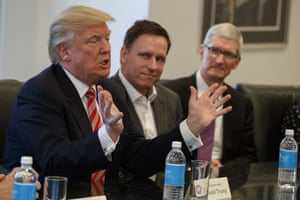Do you agree?
One of the biggest puzzles about our current predicament with fake news and the weaponisation of social media is why the folks who built this technology are so taken aback by what has happened. Exhibit A is the founder of Facebook, Mark Zuckerberg, whose political education I recently chronicled. But he's not alone. In fact I'd say he is quite representative of many of the biggest movers and shakers in the tech world. We have a burgeoning genre of "OMG, what have we done?" angst coming from former Facebook and Google employees who have begun to realise that the cool stuff they worked on might have had, well, antisocial consequences.
Put simply, what Google and Facebook have built is a pair of amazingly sophisticated, computer-driven engines for extracting users' personal information and data trails, refining them for sale to advertisers in high-speed data-trading auctions that are entirely unregulated and opaque to everyoneexcept the companies themselves.
The purpose of this infrastructure was to enable companies to target people with carefully customised commercial messages and, as far as we know, they are pretty good at that. (Though some advertisers are beginning to wonder if these systems are quite as good as Google and Facebook claim.) And in doing this, Zuckerberg, Google co-founders Larry Page and Sergey Brin and co wrote themselves licences to print money and build insanely profitable companies.
It never seems to have occurred to them that their advertising engines could also be used to deliver precisely targeted ideological and political messages to voters. Hence the obvious question: how could such smart people be so stupid? The cynical answer is they knew about the potential dark side all along and didn't care, because to acknowledge it might have undermined the aforementioned licences to print money. Which is another way of saying that most tech leaders are sociopaths. Personally I think that's unlikely, although among their number are some very peculiar characters: one thinks, for example, of Paypal co-founder Peter Thiel – Trump's favourite techie; and Travis Kalanick, the founder of Uber.
So what else could explain the astonishing naivety of the tech crowd? My hunch is it has something to do with their educational backgrounds. Take the Google co-founders. Sergey Brin studied mathematics and computer science. His partner, Larry Page, studied engineering and computer science. Zuckerberg dropped out of Harvard, where he was studying psychology and computer science, but seems to have been more interested in the latter.
Now mathematics, engineering and computer science are wonderful disciplines – intellectually demanding and fulfilling. And they are economically vital for any advanced society. But mastering them teaches students very little about society or history – or indeed about human nature. As a consequence, the new masters of our universe are people who are essentially only half-educated. They have had no exposure to the humanities or the social sciences, the academic disciplines that aim to provide some understanding of how society works, of history and of the roles that beliefs, philosophies, laws, norms, religion and customs play in the evolution of human culture.
We are now beginning to see the consequences of the dominance of this half-educated elite. As one perceptive observer Bob O'Donnell puts it, "a liberal arts major familiar with works like Alexis de Tocqueville's Democracy in America, John Stuart Mill's On Liberty, or even the work of ancient Greek historians, might have been able to recognise much sooner the potential for the 'tyranny of the majority' or other disconcerting sociological phenomena that are embedded into the very nature of today's social media platforms. While seemingly democratic at a superficial level, a system in which the lack of structure means that all voices carry equal weight, and yet popularity, not experience or intelligence, actually drives influence, is clearly in need of more refinement and thought than it was first given."
All of which brings to mind CP Snow's famous Two Cultures lecture, delivered in Cambridge in 1959, in which he lamented the fact that the intellectual life of the whole of western society was scarred by the gap between the opposing cultures of science and engineering on the one hand, and the humanities on the other – with the latter holding the upper hand among contemporary ruling elites. Snow thought that this perverse dominance would deprive Britain of the intellectual capacity to thrive in the postwar world and he clearly longed to reverse it.
Snow passed away in 1980, but one wonders what he would have made of the new masters of our universe. One hopes that he might see it as a reminder of the old adage: be careful what you wish for – you might just get it.




No comments:
Post a Comment